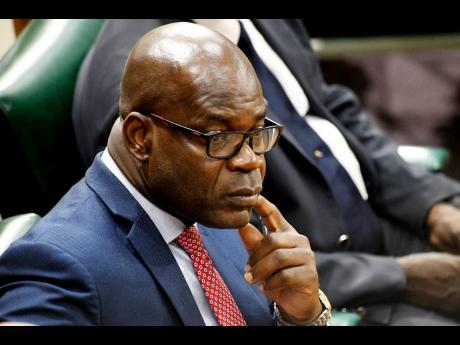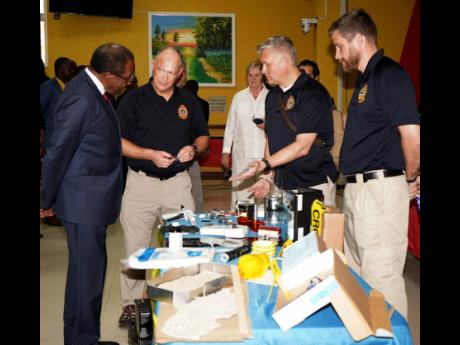JCF boosts evidence collection capacity
DCP Bailey says training was done in response to Chief Justice’s observations
UNITED STATES (US) embassy officials and the Jamaica Constabulary Force (JCF) are confident that the completion of an evidence collection training for local investigators will boost the force’s investigative capacity in crime fighting.
Thirty serving members of the JCF graduated yesterday from the one-week training exercise hosted by International Narcotics and Law Enforcement (INL) office and the Federal Bureau of Investigation (FBI) at the National Police College of Jamaica in Twickenham Park, St Catherine.
US Ambassador to Jamaica, N. Nick Perry, said that he was delighted to recognise and honour the accomplishments of the carefully selected JCF members who have completed the evidence collection training.
“This rigorous training, provided through a joint effort between the International Narcotics and Law Enforcement office and the Federal Bureau of Investigation has equipped each graduate with the skills and expertise to gather evidence from complex crime scenes more effectively, while adhering to the highest legal and ethical standards,” Ambassador Perry said.
He said that the US government continues to partner with Jamaican authorities to provide capacity building assistance to aid criminal justice actors, including the JCF, to combat organised crime and improve citizen security.
According to the ambassador, the successful completion of the training marks an essential step towards enhancing Jamaica’s abilities to uphold justice and maintain the integrity of its legal system.
CORNERSTONE OF ROBUST LAW ENFORCEMENT
“The collection of evidence lies at the heart of robust law enforcement. It is the cornerstone upon which cases are built, ensuring that criminals are held accountable for their mal-actions and that victims receive the justice they rightfully deserve,” Perry said.
Perry also said the training will help put lawbreakers, criminals and those who disturb the peace and threaten the safety and security of law-abiding citizens behind bars before they can commit more crimes.
“Each piece of evidence collected tells a story. Whether it is a fingerprint, a strand of hair, or a digital footprint, every detail matters,” he said.
Perry said he anticipates further collaboration between the US and Jamaican governments to foster a safer Jamaica.
“This training’s impact extends beyond your graduation today and has the power to shape the practices of officers across Jamaica, emphasising its profound and far-reaching influence as we advance the principles of maintaining a fair and just society,” Perry said.
Speaking with The Gleaner after the ceremony, Deputy Commissioner of Police (DCP) Fitz Bailey heaped praise on INL and the US government for its continued collaboration and partnership in crime fighting and policing generally.
“The fact is the officers who came on the course they were exposed to some new procedures as it relates to evidence collection. Various types of evidence-based and scientific data. The fact is I believe we will see better quality cases being brought before the court in terms of chain of custody of evidence,” DCP Bailey said.
DCP Bailey heads the Criminal Investigation Branch (CIB) and believes that ultimately the training will enhance the JCF’s transformation.
“We have a wide cross section of police officers not only from the CIB, we have people from scene of crime who are actually involved in this, “ DCP Bailey said.
He told The Gleaner that repeated public chiding by Chief Justice Bryan Sykes about the tardiness of evidence gathering and incomplete files which delayed justice prompted the JCF to seek assistance.
“We had that gang matter and the chief justice had made some observations, so it’s coming out of that. I actually reached out to INL because I thought that there are some things that needed to be improved and whilst we have certain capacity here, we decided to seek some international support and INL was willing to provide that support for us, making some FBI trainers available to present the course to the officers,” DCP Bailey said.
DCP Bailey told The Gleaner that five days was sufficient for the training because the officers are already embedded in evidence gathering.
“It was basically to sharpen the skills and sometimes there might be some small gaps and I think those gaps were filled. Having done the assessment, I think the one week was adequate based on the objective that was set,” DCP Bailey said.
Last year during the One Don Gang trial, Chief Justice Sykes bemoaned the lack of supporting evidence from the police, stating that the practice was poor and unacceptable.
During summation in what was dubbed the trial of the century, Justice Sykes said there was no supporting evidence, including photographs and spent casings on two of the counts which relate to the killing of a man called ‘Outlaw’ in Top Lauriston, St Catherine, on November 2, 2017 and the killing of a man in the vicinity of Thermo-Plastics in the Twickenham Park area.
Justice Sykes said then that he was not referring to shootings that occurred several decades ago, and questioned why supporting evidence was missing in incidents that occurred just four years ago.
The trial judge said the lack of supporting evidence creates difficulty in pinning down the dates when the incidents occurred.
He also said the evidence would have assisted the court in determining the specific dates of the incidents and may very well have covered the period when some of the defendants claimed they were in custody.


